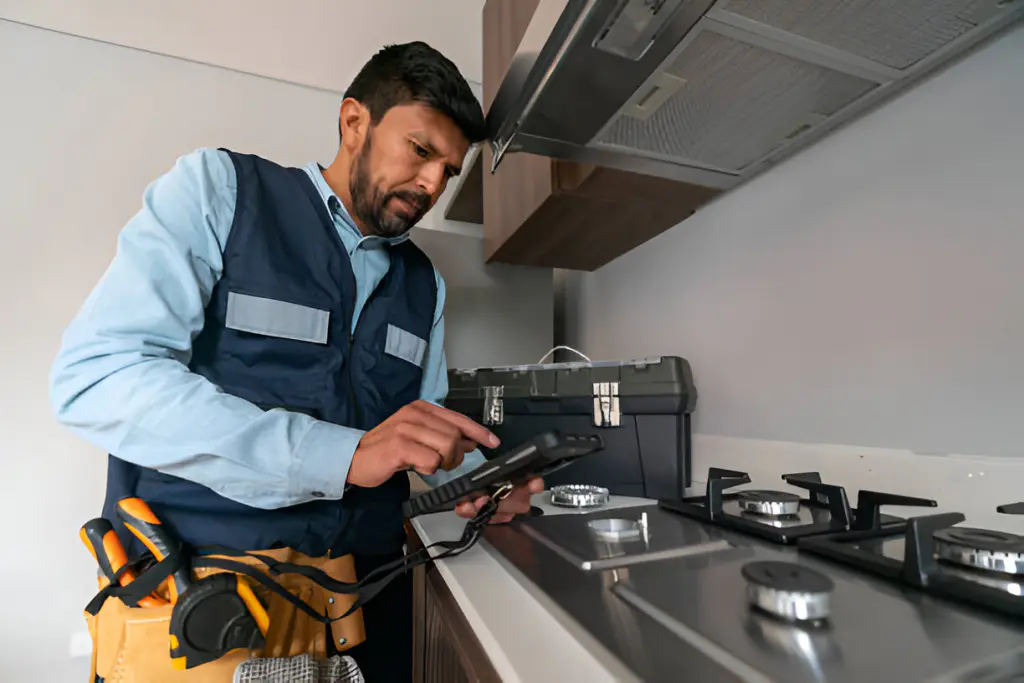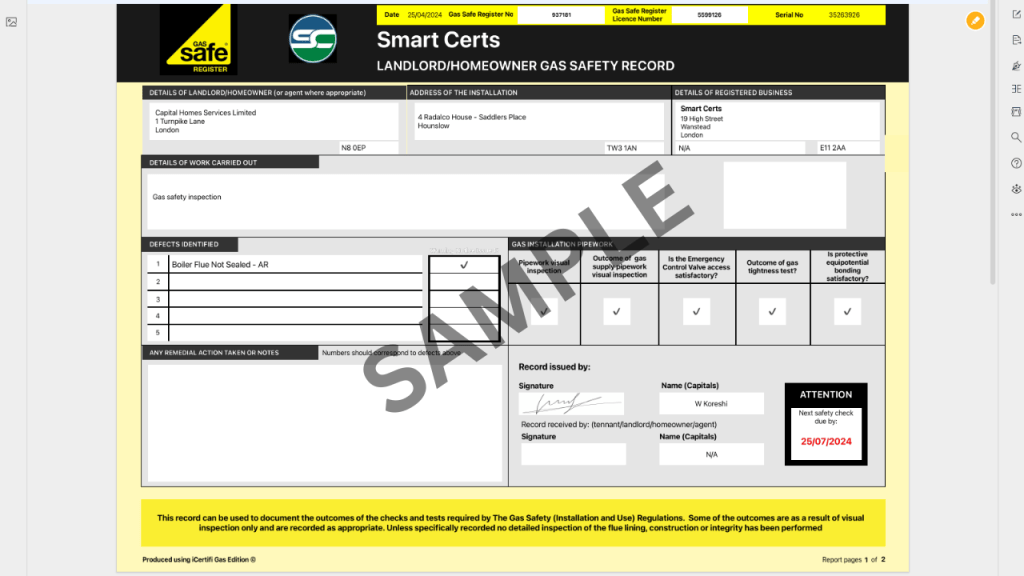Just as I was signing my own tenancy agreement, it struck me how many property owners and renters alike may not be fully aware of the UK Gas Safety Regulations for Tenants & Landlords.
As a landlord, you’re legally required to ensure gas equipment in your properties is safely installed and maintained. But, as a tenant, are you aware of your own rights and obligations?
We all know gas-related accidents can be deadly, but who bears the brunt of the responsibility? Let’s explore the intricacies of these regulations and why they’re so vitally important.
gas safety (installation and use) regulations 1998
In examining the Gas Safety (Installation and Use) Regulations 1998, it’s essential to understand that they serve as a comprehensive guide for the safe installation, maintenance, and use of gas systems and appliances in the UK. This Regulation Overview details a set of safety measures designed to mitigate potential risks associated with gas usage.

Having delved into these safety measures, I’ve assessed how they’re intended to curb the risk of gas leaks, explosions, and carbon monoxide poisoning. They require gas appliances to be installed and maintained by a ‘Gas Safe’ registered engineer, thereby ensuring that work is carried out to a high standard of safety.
The impact of this legislation has been significant, creating a safer environment for all. It has instilled a culture of safety awareness and responsibility among gas users and professionals.
Compliance procedures involve regular inspections, maintenance, and immediate corrective action when safety issues arise. Non-compliance can result in hefty fines or even imprisonment. In conclusion, the Gas Safety (Installation and Use) Regulations 1998 form a robust framework that protects the public from the dangers of gas usage, while maintaining high standards in the industry.
New uk gas safety regulations for tenants and landlords
Recently, there’s been a noteworthy development in UK gas safety regulations specifically tailored for tenants and landlords. The legislation has seen significant regulation updates, altering the dynamics of tenant responsibilities and landlord obligations.
From the perspective of tenants, they’re now expected to provide unrestricted access for safety inspections. This update is designed to ensure that all gas appliances and flues are maintained in a safe condition. Failure to comply may lead to significant penalties, highlighting the seriousness of regulation enforcement.
On the other hand, landlords face increased obligations too. They must ensure gas appliances, fittings, and chimneys are safe for their tenants. This includes arranging annual gas safety checks by a registered engineer, maintaining accurate records, and providing tenants with a copy of the safety check record.
The shift in regulation is a clear attempt to ensure both parties share the responsibility of gas safety. It underscores the importance of a collaborative approach, where both tenants and landlords actively participate in maintaining safety standards.
Understanding these changes is crucial for those involved in the rental market. As the landscape evolves, staying informed will ensure compliance and safeguard the wellbeing of all parties.
Do i need a gas safety certificate
Shifting our focus from the broader responsibilities of landlords and tenants, let’s now tackle the question, ‘Do I need a gas safety certificate?’ The short answer is yes. If you’re a landlord, it’s legally required to ensure gas appliances, installations, and flues provided for tenants are safe. This involves obtaining a gas safety certificate, conducted annually by a Gas Safe registered engineer.
Now, let’s delve into the specifics. Certificate Validity is 12 months from the date of issue. Certificate Costs vary, so it’s worth shopping around. However, remember that safety is paramount, so don’t be tempted to cut corners.
Non Compliance Penalties are severe, with fines, imprisonment, or both. It’s also worth noting that lack of certification can invalidate your property insurance. As for Tenant Responsibilities, these are limited to cooperating with landlords and engineers and promptly reporting any gas-related issues.
Landlord electrical safety certificate
Turning our attention to the topic of electrical safety, it’s crucial to note that landlords in the UK are also required to obtain an electrical safety certificate, demonstrating that all electrical installations in the property are safe and properly maintained.

The Certificate Costs can vary, depending on the size of the property and complexity of the electrical system. They’re typically affordable, but a necessary expense for any responsible landlord. As for inspection frequency, regulations stipulate a thorough inspection at least every five years. However, for older properties or those with a history of electrical issues, more frequent checks are advisable.
The Certificate Validity, typically five years, is subject to the electrician’s professional judgment. If they deem the system high-risk, they might suggest a shorter validity period. It’s important that the electrician possesses the necessary qualifications – they should be a registered member of a competent person scheme, such as NICEIC or ELECSA.
Certificate Renewal is straightforward, but should be scheduled well in advance of the expiration date to ensure continuous compliance. If the certificate expires without renewal, landlords could face significant penalties, not to mention putting their tenants at risk.
Gas safety check near me
In the same vein as electrical safety, landlords must also ensure gas safety by seeking out a local, professional service for a ‘Gas safety check near me’. It’s paramount to remember that gas safety isn’t a one-time affair but requires regular checks. The check frequency is typically annual but could be more frequent depending on the property’s gas usage and complexity of the installation.
Professional services are essential for these checks, as they’ve the necessary expertise and equipment to detect and rectify any potential issues. These services also provide landlords with a gas safety certificate, a legal requirement in the UK. The check costs can vary depending on the service provider and the extent of the check, but it’s a necessary investment for the safety of the tenants and the property.
Moreover, safety precautions shouldn’t be limited to regular checks alone. Landlords should also establish clear emergency procedures in case of a gas leak or other gas-related emergencies. This includes providing tenants with emergency contact details and instructions on what to do in such situations. After all, prompt and effective action can make a significant difference in ensuring safety and preventing potential disasters.
Frequently Asked Questions
What Are the Penalties for Landlords Who Do Not Comply With the UK Gas Safety Regulations?
If landlords don’t follow gas safety regulations, they’ll face hefty fines, legal actions, and may need to compensate tenants. To avoid these, they should adhere to rules, reducing safety violation costs and non-compliance consequences.
Does a Tenant Have Any Legal Responsibilities Regarding Gas Safety in a Rented Property?
Yes, as a tenant, I’ve legal responsibilities too. I must allow access for safety checks, promptly report any gas-related issues, and can claim rent abatement or insurance if my landlord neglects their duties.
What Are the Specific Qualifications Required for Someone to Conduct a Gas Safety Check?
To conduct a gas safety check, one needs specific qualifications. This includes undergoing a certification process, taking training courses, meeting experience requirements, passing skill assessments, and being recognized by relevant regulatory bodies.
How Often Should a Landlord Replace Gas Appliances in a Rented Property According to UK Regulations?
UK regulations don’t specify a lifespan for gas appliances. However, it’s my responsibility to ensure they’re safe, so regular maintenance and safety inspections are key. I’ll replace them as needed, always communicating with my tenant.
Are There Any Specific Regulations Related to Gas Safety in Shared Accommodation or Student Housing?
Yes, shared accommodation and student housing have specific gas safety regulations. These cover shared accommodation hazards, student housing rights, gas leak precautions, emergency protocols, and clear maintenance responsibilities for landlords.
Conclusion
In conclusion, the UK gas safety regulations are crucial for both tenants and landlords. It isn’t just about obtaining a gas safety certificate, but also about adhering to the Gas Safety (Installation and Use) Regulations 1998. Landlords also need an electrical safety certificate.
It’s not a hassle, as there are plenty of places to get a gas safety check near me. It’s all about ensuring safety, maintaining legal compliance, and fostering trust.









